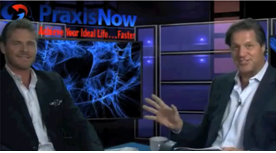Part 6 in the video series. Subscribe for email alerts when more videos are posted.
More from this series:
Creating Corporate Culture – Part 1
Creating Corporate Culture – Part 2
Creating Corporate Culture – Part 3
Creating Corporate Culture – Part 4
Creating Corporate Culture – Part 5
John Assaraf sat down with Steven Cox, CEO of TakeLessons.com, to discuss what it means to create and maintain a thriving corporate culture. In this interview, Cox defines corporate culture, outlines steps entrepreneurs can take to define their company’s culture and shows how a strong culture can translate into other great gains for any organization.
Assaraf: And your BHAG is?
Cox: We want to be a billion dollar company within six years.
A: With a “B”. Six years, a billion dollar company, and I’d bet my money on him achieving it, trust me.
C: And the second part of that, we want to be a billion dollar company but we also want to be one of America’s top one hundred companies to work for. So for our value system, both of these things have to produce well; the ecosystem of the way we’re making money and the way we develop people. So let’s talk a little bit about our core values and how they came about. So, we had been in business for a couple years, and core values aren’t the kind of thing that you sit down one day and say, “Steven said we need core values so let me write some things down because I think they’ll help me make money.” These are things that you actually just discover as you start working with people, again even if you’re a one man or woman operation, you’ll know these about yourself. Over time, we came up with five core values and I’ll show you how we got to those core values here in a minute. So we have five core values that we developed over time as well as a core purpose and a reason for being. We exist to make a positive lasting impact on millions of people. We specifically picked every single word of that reason for being. We exist not to make a lasting impact, but it has to be positive. We exist not just to make an impact, but it has to be lasting. So we want to be involved in business that is good, holistic by nature, that has the ability to make something that people remember long term, that has the long term impact. It’s not enough for us to make an impact on hundreds of people. That’s a good start but it doesn’t excite me. Knowing my value system, I need huge impact, millions of people.
A: So let me ask you a question. When you started six years ago, did you start off with here are my five core values and here is my core purpose and reason for being?
C: No.
A: I want everyone to understand that. This is an evolution. You’re seeing six years experience that could help you get there a lot faster, these great ideas.
C: Yes. Again, this is something that’s discovered over time and it’s things that you look at and say, how do I know that that’s my core value? It’s things you look at and say, if other people or the marketplace were to turn on me because I had these values, I would still have them. And that’s the true litmus test.
A: So if the marketplace or others would turn on you, you’d still keep those values.
C: That’s right. Even if it’s detrimental to the company; to us and our ability to make money, would we still do this?
A: That’s your core essence. That’s your nucleus, what we’re talking about. You are your nucleus no matter how many divisions there are or what happens. You are the nucleus.
C: And if you can find that, what you have is a True North. You have the ability to understand why you’re in business, as Simon Sinek says, the power of understanding why you want to do things instead of just how or when. There’s an interesting thing that happened throughout the company that I’ll share with you. The core people, we had a core group of about five or six people that were there when we started and those people again are all still with us, and these core values really resonated with us. But as we started hiring people and we started bringing them on and we started training them in core values, we would say, these are our core values and they would kind of shake their head. We found out that when we started describing them, they had different views of what they meant than we did. It really helped us understand that when you build a culture it’s not enough to say, here are my values. We have to get descriptive of what that value means. So I’d like to walk through a couple of our values and explain. My value may be different from yours. And as a company, this allows us to look at someone and say does this person coming in resonate with the value system as we have described it?
Part 6 in the video series. Subscribe for email alerts when more videos are posted.
More from this series:
Creating Corporate Culture – Part 1
Creating Corporate Culture – Part 2
Creating Corporate Culture – Part 3
